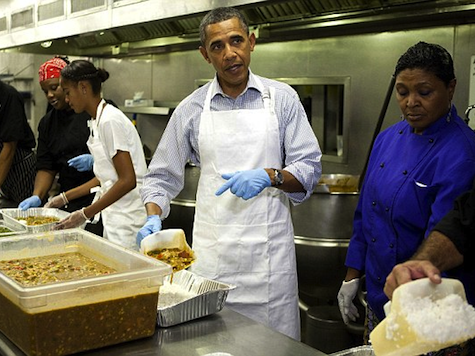President Obama’s most solid strongholds are suffering from economic disaster under his presidency, according to new reports. A University of Michigan study shows that 80 percent of people in southeast Michigan have been blasted by financial problems between 2007 and 2011. Those stastics were even higher among blacks without a college degree.
Assistant UM Professor of Social Work Kristen Seefeldt stated, according to local reports, that “researchers were shocked by the high levels of food insecurity, with nearly 28 percent of people interviewed did not have stable, reliable access to food or were forced to change their eating habits for financial reasons.” Some people, says Seefeldt, are skipping meals; that included many people with a job.
A few hundred miles to the East, Boston is running out of giveaway turkeys for the poverty-stricken. Three days in advance of Thanksgiving, the Pear Street Cupboard and Café in Framingham, Massachusetts, is out of turkeys. According to organizers, “requests for help are up 400 percent over last year.”
Moving south a few hundred miles, New York City food pantries and soup kitchens are shutting down at record rates thanks to overburden. One in four food pantries and soup kitchens have gone dark since 2007. “We’ve seen that food shortages are more commonplace and occur more broadly in our network and when people are turned away from a food pantry or a soup kitchen, it is most commonly due to a lack of food,” said Triada Stampas of the Food Bank for New York City. That was before Hurricane Sandy.
Moving to Connecticut, food bank officials are reporting serious shortages. “We’ve been hit in two directions,” explains Marjorie Dauster, a member of the Food Pantry Council. “There are economic issues in Connecticut, plus with hurricane Sandy the demand has been very high … We’re going to have a hard time serving them this year.”
Moving back to the west, St. Louis is now reporting that local food pantries are being overrun thanks to the “new poor.” Emmanuel Seventh Day Adventist Food Pantry Director Liz Chambwa says demand is up significantly: “People are losing their jobs, there’s not enough food coming in anymore for donors as much as they used to, so we really have to get out and do a lot of food drives and we get more and more people every week.”
These shortages are exacerbated by rising food costs; the USDA says that fish and chicken prices could jump 4 percent this year, with beef jumping 5 percent. Peg Bianca, executive director of the Greater Berks Food Bank in Pennsylvania, says, “It just changes the types of products we order. If tuna fish becomes too expensive, I don’t buy tuna fish. The number of people needing help doesn’t change.”
This is the new normal. And it’s set to get worse, thanks to the business impact of Obamacare and tax increases pushed by President Obama.

COMMENTS
Please let us know if you're having issues with commenting.